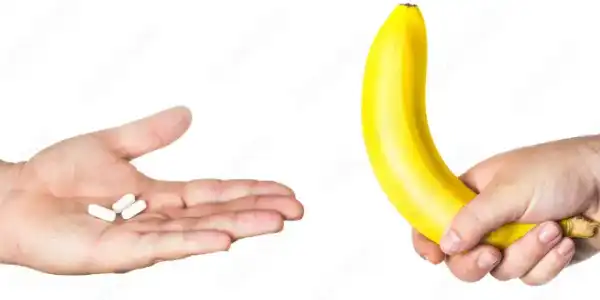Antibiotics are a kind of medication that is widely used in the treatment of bacterial infections. They either prevent bacterial infection from spreading or stop the bacterial infection completely. Bananas, on the other hand, are delicious fruits rich in nutrients and fiber. Sometimes you might try eating bananas with antibiotics, but is it a good idea?
Yes, bananas can be consumed with antibiotics. Bananas are snacks packed with extremely important minerals and vitamins. Therefore, eating bananas with antibiotics is okay because it doesn’t interfere with your system in any way.
Sometimes antibiotics may have side effects that are annoying and tormenting. Eating bananas may help in checking the associated side effects like diarrhea, gastrointestinal discomfort, and nausea.
High potassium levels in a banana aid in restoring the potassium which might have been depleted by the antibiotics. Thus it helps in minimizing electrolyte imbalance. Moreover, eating bananas introduce fibers into your digestive tract. Fibers generally seize constipation, which is another possible side effect of antibiotics.
Nevertheless, you should note that certain fruits may react with antibiotics and hinder the absorption of either the fruit or drugs. Therefore, it is advisable to seek a doctor’s assistance whenever you feel like eating some fruits and antibiotics.
What should I not eat with bananas?
Avoid mixing acidic fruits like strawberries and grapefruits, or foods that are acidic such as pomegranates, apples, and peaches with bananas.
Milk should not be drunk with bananas because it is likely to hinder the absorption of the fruit.
Unlearn the habit of eating bananas with vegetables. Vegetables and fruits are digested differently, that is, fruits are digested faster compared to vegetables.
Fruits are partially digested before they reach the stomach. Above all, they have high sugar content. The quick digestion of fruits may affect the digestion of vegetables.
Drinking water immediately after eating a banana can cause extreme ingestion. Cold water is especially dangerous because its inherent characteristics are similar to that of a banana. The similarity in the properties causes a clash which leads to ingestion.
What should I not eat with antibiotics?
Antibiotics are effective drugs that are taken to clear up infections. Antibiotics work best when they are dosed perfectly as prescribed by medical personnel. But sometimes, these drugs can fail to work and cause you more illness if not taken with caution.
For instance, certain foods may prevent proper absorption of the drugs into your body. Other foods may cause side effects that are worse than the disease which you intend to cure. The side effects include; gastrointestinal upset, gas, and diarrhea, and sometimes it may lead to nausea.
The following are some of the foods that might interfere with antibiotics;
1). High acidic foods.
Tomato products, chocolate, oranges, soda, grapefruits, and other citrus fruits and juices contain a high level of citric acid. For certain antibiotics, high acidic content would decrease the amount of medicine your system absorbs.
If you like these fruits, space them two hours after taking your antibiotics or six hours before taking the drugs. It would reduce the risk of rendering the antibiotics useless due to failure of absorption.
2). Caffeine.
Antibiotics may cause your body to stop metabolism and in turn, make caffeine stay long in your system. The effects of staying under the influence of caffeine for a long time include;
Sleepless nights
Caffeine always has the effect of keeping one awake and alert, and this may be dangerous at night as it may cause sleeplessness.
Diuretic effect
It has the effects of frequent urination, fatigue, and muscle cramps.
Jitters
You become extremely nervous throughout the day.
3). Dairy products and calcium-rich foods.
Be it yogurt, cheese, milk, cream, or butter, the calcium in these products is a problem when taken with antibiotics. Antibiotics such as fluoroquinolones bind with calcium and prevent them from being absorbed.
It can be better for you if you space these foods six hours before you take your dose or two after a dose.
4). Alcohol
Put alcohol or any other hard drink on hold until after you have completed the course of antibiotics. Consuming alcohol while taking these drugs may cause extreme vomiting, nausea, and headaches. Completely abstain from alcohol consumption during your medication otherwise, the drugs will go to waste.
5). Multi-vitamins and antacids.
Antacids and multi-vitamins contain minerals which are mainly aluminum, calcium, iron, magnesium, and zinc. These minerals are known to bind with antibiotics and prevent the absorption of the drugs.
What is the best food I should eat with antibiotics?
1). Soup.
Soups which does not contain cheese, cream, or tomatoes can be the best to take with antibiotics. These soups always contain important prebiotic foods such as onions, garlic, vegetables, and beans that enable healthy bacteria to regrow.
2). Fermented foods.
Fermented foods contain important prebiotics that supports your gut and can aid in offsetting the harmful side effects of antibiotics.
3). Probiotic supplements.
Probiotics are helpful because they introduce useful bacteria into your system. They may also heal in dealing with diarrhea. If the medical person has prescribed probiotics to be taken with antibiotics, go ahead and take them together. Otherwise, always read and follow the instructions on the labels.
4). Water
For your medication to be effective, your body needs to be hydrated always. Water is necessary for the body because it enables your body to fight infection with ease. It also combats the gastrointestinal side effects of certain antibiotics.

